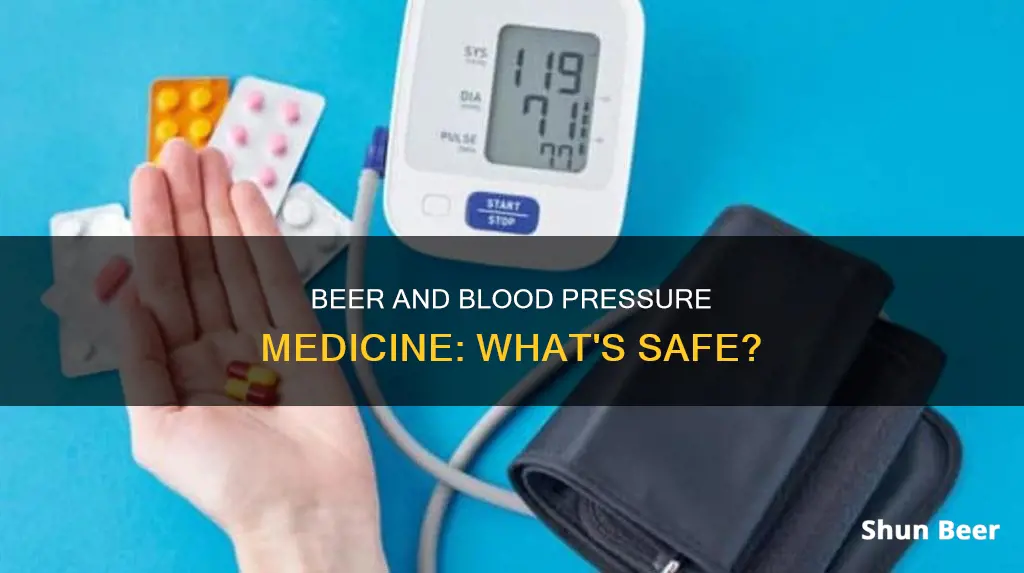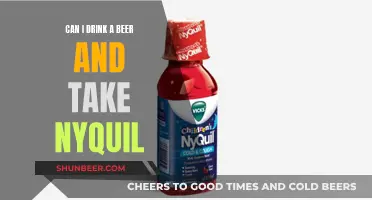
Drinking alcohol while on blood pressure medication is a serious concern and can lead to adverse health effects. Alcohol can cause high blood pressure and may reduce the effectiveness of medication. Mixing the two can lead to dizziness, drowsiness, fainting, and a fast heart rate. The more you drink, the greater the risks. It is always best to consult a doctor or pharmacist about potential interactions and whether it is safe to consume alcohol with your specific medication.
| Characteristics | Values |
|---|---|
| Can I drink beer on blood pressure medicine? | It depends on the medication and your medical history. It's best to consult a doctor. |
| What are the risks of drinking beer while on blood pressure medicine? | Increased side effects such as dizziness, fainting, drowsiness, low blood pressure, upset stomach, nausea, vomiting, heart rhythm problems, and liver problems. |
| What type of blood pressure medications are riskier to mix with alcohol? | Alpha-blockers, beta-blockers, and calcium channel blockers. |
| What is the recommended alcohol intake to manage high blood pressure? | No more than two drinks per day for men and one drink per day for women. |
What You'll Learn

Alcohol and blood pressure medicine can cause orthostatic hypotension
Orthostatic hypotension is caused by a combination of factors. When you stand up, blood in your legs and feet has a harder time reaching your heart, resulting in less blood being available for your heart to send to organs and muscles. Additionally, alcohol and certain blood pressure medications can cause vasodilation, or blood vessel dilation, which can lead to a further drop in blood pressure.
The risk of orthostatic hypotension is increased when consuming alcohol with certain classes of blood pressure medications, including:
- ACEIs or ARBs (e.g. lisinopril or losartan)
- Alpha-blockers (e.g. clonidine or doxazosin)
- Antianginal agents (nitrates) (e.g. nitroglycerin or isosorbide)
- Beta-blockers (e.g. atenolol or metoprolol)
- Diuretics (e.g. hydrochlorothiazide or furosemide)
- Calcium channel blockers (e.g. verapamil or amlodipine)
The side effects of consuming alcohol with these medications include dizziness, a fast heart rate, fainting, drowsiness, low blood pressure, or a dangerous fall or injury. These effects can be particularly serious in older patients and can lead to bone fractures or concussions from falls.
To reduce the risk of orthostatic hypotension, it is recommended to limit alcohol consumption to no more than two drinks per day for men and one drink per day for women. Additionally, those prone to orthostatic hypotension should keep their temperature moderate, stay hydrated, avoid sleeping flat, and prepare their body before standing by giving themselves more time to move into a standing position.
Beer and the DASH Diet: What You Need to Know
You may want to see also

Drinking alcohol with certain medications can be dangerous
Drinking alcohol while taking medication for high blood pressure can be dangerous. Alcohol can cause high blood pressure, and it can also affect how well your medication works. Mixing the two can lead to a range of side effects, including dizziness, a fast heart rate, drowsiness, low blood pressure, and an increased risk of falling.
If you are taking medication for high blood pressure, it is generally recommended that you avoid alcohol. This is because alcohol can interfere with the effectiveness of the medication and make it harder to treat hypertension. Alcohol is metabolized in the liver, which is also responsible for breaking down medication. When you drink alcohol, it can change the way your body metabolizes your medication, leading to a range of side effects.
The specific side effects will depend on the type of blood pressure medication you are taking. For example, if you are taking alpha-blockers, drinking alcohol can cause a significant drop in blood pressure, as well as lightheadedness, drowsiness, and an increased risk of falling. On the other hand, if you are taking beta-blockers, alcohol can add to the blood pressure-lowering effects of the medication, leading to dizziness, lightheadedness, fainting, and changes in heart rate.
It is important to note that the risks of mixing alcohol and blood pressure medication can vary depending on your individual health history, age, and other medications you may be taking. Therefore, it is always best to consult your healthcare provider to determine if it is safe for you to consume alcohol while taking your medication. They will be able to advise you based on your specific situation and prescribe an alternative medication if necessary.
Additionally, it is worth mentioning that excessive alcohol intake can also lead to weight gain, which can further contribute to high blood pressure and heart disease. Therefore, it is generally recommended to limit alcohol consumption to no more than two drinks per day for men and one drink per day for women.
Beer Hangover Cure: Fact or Fiction?
You may want to see also

Alcohol can cause high blood pressure
The American Heart Association recommends no more than two drinks per day for men and one drink per day for women. Generally, one drink equals 12 ounces of beer (5% alcohol), an 8-ounce malt liquor (7% alcohol), a 5-ounce glass of wine (12% alcohol), or 1.5 ounces of 80-proof liquor.
Excessive alcohol intake can also lead to weight gain, which may further contribute to high blood pressure or heart disease. Additionally, alcohol can interact with common heart or blood pressure medications, causing side effects such as dizziness, a fast heart rate, fainting, drowsiness, low blood pressure, or an increased risk of falls and injuries.
Alcohol use can also affect the liver, altering drug levels in the bloodstream and potentially worsening medication side effects or reducing the effectiveness of the prescribed treatment. Therefore, it is essential to inform your doctor or healthcare provider if you consume alcohol and are taking any medications for high blood pressure or related conditions.
Coeliacs and Beer: What's Safe to Drink?
You may want to see also

Alcohol may affect medication effectiveness
Additionally, alcohol is broken down in the liver, which is also responsible for metabolizing medications. Consuming alcohol can slow down the clearance of blood pressure medications from the body, leading to higher drug levels in the bloodstream. This can enhance the medication's effects and increase the risk of side effects.
Furthermore, alcohol can cause weight gain, which can contribute to high blood pressure or heart disease. Excessive alcohol intake can also worsen high blood pressure, making it harder for medications to be effective. Alcohol may also interact with specific types of blood pressure medications, such as ACE inhibitors, ARBs, calcium channel blockers, beta-blockers, diuretics, and alpha-blockers, increasing the risk of side effects.
It is important to note that the effects of alcohol on medication effectiveness can vary from person to person. Age, current health status, and other medications are factors that can influence the impact of alcohol on medication effectiveness. Therefore, it is always advisable to consult a healthcare provider to determine if it is safe to consume alcohol while taking blood pressure medication.
Beer and Lamotrigine: What You Need to Know
You may want to see also

Alcohol and blood pressure medicine can cause side effects
Common heart or blood pressure medications can interact with alcohol, resulting in side effects such as dizziness, a fast heart rate, fainting, drowsiness, low blood pressure, or an increased risk of falls and injuries. These side effects can be severe and may require emergency medical attention. Mixing alcohol with medications such as ACE inhibitors, ARBs, alpha-blockers, beta-blockers, diuretics, and calcium channel blockers can increase the likelihood and severity of these side effects.
Furthermore, alcohol is metabolised in the liver, which is also responsible for breaking down medications. Consuming alcohol can alter the way the liver processes these drugs, leading to higher drug levels in the bloodstream. This can enhance side effects or reduce the effectiveness of the medication. It is crucial to consult a healthcare provider to understand the specific interactions and risks associated with alcohol and your prescribed blood pressure medication.
The combination of alcohol and blood pressure medication can also lead to orthostatic hypotension, which is a sudden drop in blood pressure when standing up from a sitting or lying down position. This can cause dizziness, lightheadedness, and fainting. To mitigate these effects, it is recommended to avoid standing up quickly. Additionally, alcohol can worsen pre-existing liver disease and cause further damage to the organ.
While an occasional drink may be deemed safe by a medical professional, it is generally recommended to avoid alcohol while taking blood pressure medication. The specific guidelines depend on individual factors such as age, health status, and other medications being taken. It is crucial to consult with a healthcare provider to determine if it is safe to consume alcohol and to understand the risks and potential side effects.
Pensacola Beach's Beer Laws: Drinking Scenarios Explained
You may want to see also
Frequently asked questions
It is not recommended to drink alcohol while taking blood pressure medication. Alcohol can increase the effects of blood pressure medicine, causing your blood pressure to drop too low, which can be dangerous.
Drinking alcohol while taking blood pressure medication can lead to side effects such as dizziness, lightheadedness, drowsiness, fainting, and heart rhythm problems. It can also make the medication less effective.
No, all blood pressure medications have risks when mixed with alcohol. It is important to ask your doctor about the specific medication you are taking and whether it is safe to consume alcohol.
Regular alcohol intake can lead to high blood pressure. Alcohol can cause weight gain, which can also contribute to high blood pressure.
The U.S. Dietary Guidelines for 2020-2025 recommend moderate drinking for people assigned male at birth as two alcoholic drinks per day or less, and for people assigned female at birth as one drink or less per day. However, even moderate drinking may worsen blood pressure problems, so it is important to consult with a healthcare professional.







